Cindy McCain Rolls Up Her Sleeves
The poised, wealthy wife isn't what she seems: Just ask her about her hard-core aid work in Rwanda — and the bath she once took in a catfish tank.
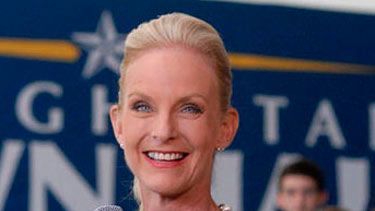
Cindy McCain has the chilly, blonde beauty of someone who lives in fear of chipping a nail — not someone who's been doing relief work on the ground in places like El Salvador for more than two decades. But then, as Marie Claire learned, John McCain's wife is full of surprises (who knew she was addicted to Xbox).
Marie Claire: You're a race-car driver, a former rodeo queen...
Cindy McCain:
[laughs] Yeah, that was a long time ago, though.
MC: You're also an heiress to a Budweiser distributorship, with impeccable style and a reserve that some have called standoffish.
CM:
It's not standoffishness. I'm shy, to be honest with you. It's no more than that: I'm a little bit shy. I've offered voters the opportunity to get to know me; I talk a great deal and hope people will read what's been written about me.
Stay In The Know
Get exclusive access to fashion and beauty trends, hot-off-the-press celebrity news, and more.
MC: You recently returned from Rwanda, and you're involved with a number of humanitarian agencies. What sparked your relief work?
CM:
It's a very, very simple reason: I became a mother. I have four children, and something happened to me once I started raising them. I would go out and see these other people around the world, particularly the mothers, and I could relate to how they feel. You would do absolutely anything to help your child.
MC: What was the first rough spot you visited?
CM:
Actually, it was kind of accidental. My husband and I were on vacation, and we were in a very tiny place called Truk Lagoon, in the middle of the Pacific Ocean. We were there with another couple, and we were doing all these water sports, and our friend had a very minor accident, but she needed some stitches. So we wound up going to the hospital ... and I couldn't believe what I saw. I mean, it was dreadful: rats in the yard, cats running everywhere, sewage, and no beds. It was particularly poignant because at that time Truk was part of the trust territories of the United States, so they were actually under U.S. jurisdiction. So for all intents and purposes, this was a U.S. hospital. I told the hospital administrator, "Look, you guys need a few things. Let's see what I can do." And I went home and started calling friends, saying, "I need some beds; I need some X-ray film." And that's how it started. We began putting medical teams together for that island and then for other places around the world.
MC: Angelina Jolie or Mother Theresa?
CM:
Oh, Mother Theresa. I had the opportunity to meet her a couple of times, and the very first time I was so nervous. I met her in Calcutta, and I was clutching a photograph of my youngest daughter after I adopted her from Mother Theresa's orphanage in Bangladesh. I thought, I just have to show her what a gift my daughter is to me, and before I could get the photo out of my hand, she looked up — she was very diminutive — and said, "I know, I know. God gave her to you."
MC: How did you come to adopt Bridget, who's now 17?
CM:
I was working with my medical team in Dhaka, and we had some very good friends who are Catholic and had said, "While you're there, why don't you see if you can find Mother Theresa's orphanage?" The orphanage was very difficult to find because there were no street signs. But when we finally got in, there were 160 newborn little girls. Quite frankly, little girls are disposable in many ways in those countries. So we just started helping the nuns. They needed a lot of things. We brought clothes for them — you know, everything. And when it came time for me to begin to plan the trip home — the nuns saw it, I think, before I did — I'd developed a very special relationship with Bridget. And they prevailed upon me to get her out. She had a very serious cleft palate. And I said, "Yeah, I guess I can." My husband did not know.
MC: So was it a "Honey, look what I've done"?
CM:
Uh-huh. I walked off the plane, and my husband looked at me, and he said, "Where's she going to go?" And I said, "She's coming to our house." And he never missed a beat. But he and I both will tell you that, quite frankly, she chose us.
MC: Celebrities always make overseas adoptions look so easy. But families often complain about the arduous process. Is there a double standard?
CM:
I don't know. Because there is a vast difference between foreign adoption and domestic adoption. And I will say that if the opportunity comes, my husband and I are going to hopefully be able to help speed the process for domestic adoption. We heard a story the other day where a couple waited three years to adopt. And this is in Michigan. That's unacceptable. We have so many kids in foster care right now who are begging for homes, and there are couples who want them. There has to be some better way than this. So I don't know if there's a double standard, but I know why people do go overseas many times. It is because it's easier. People are anxious for children. I mean, who wouldn't be? We all love children. Adoption — that's something that we've really got to do something about.
MC: What do you want women here to know, about your relief work and about what you've seen around the world?
CM:
You know, really what I'd like women to know is that I'm no different than they are. I worry about the same things. I mean, I tell everybody — and it's the honest truth — that I worry more about my children's education than anything else ever, with them — the future, what's going to happen to them, that they have the best opportunities possible. So I'm no different than anybody else out there. But what my relief work has given me is an insight into what's really, truly important, and that's why I keep doing it. Because the relief work isn't about me, it's about everybody else and all the people who are involved in it. You know, if we can help one person, that's why we're there; we've done our job.
MC: The places you've worked aren't exactly garden spots. What's the roughest it's gotten?
CM:
I've camped in the desert with the Army in Kuwait, and then worked in Iraq. I've bathed in a catfish tank and lived in an abandoned church in El Salvador. [laughs] It's been pretty bad, let me tell you. But it never has been about the amenities; it's about getting the job done. And I sit here today in a lovely setting and dressed very nicely, but I'm actually much happier wearing my grubbies.
MC: So would we see Cindy McCain on the weekend in battered old jeans, slumming it?
CM:
Absolutely. [laughs] Yeah. I'm much more comfortable in my ripped jeans.
MC: Who's your favorite designer?
CM:
For designer fashion, probably Oscar de la Renta.
MC: What's your most regrettable outfit?
CM:
Oh, regrettable — oh my. I'm sure there are plenty. I grew up in the era of miniskirts; it was awful. Remember those chunky platform shoes? They were terrible. Probably those.
MC: And your favorite outfit?
CM:
A pair of jeans and a T-shirt. And a baseball hat.
MC: How do you deal with the negative things that come out in campaigns, like the rumor that was floated in 2000 that Bridget was in fact John's illegitimate daughter?
CM:
You know, I stopped reading all this stuff years ago. Now with regard to what happened in 2000 with my daughter: She was young then and didn't know anything about it. But about a year-and-a-half ago, she Googled herself and read all this. And in her mind and at her age, she felt like this was her fault. She didn't understand why people didn't like her, and they didn't like her because she's black. So I'm dealing with a whole different set of issues here with this, and so it's my job now as a mother to make sure she's protected, but also to make sure she understands that this is just politics. And unfortunately, that's the downside to it.
MC: Both of your sons are in the military; Jimmy, your youngest, fought with the Marines in Iraq. What was it like to see a son off to war?
CM:
You know, I have seen other young men and women go off, and I really thought I understood what that meant, because my husband's family has these generations of service. But it was a tough one for me, because I was watching my son leave this time. So I was extremely proud; I was also very nervous and very scared. But if you've never seen a group of — and I'll say Marines, because that was what I saw — a group of Marines either leave or come home, I suggest you go, because there is nothing like it. These kids are as proud as proud can be.
MC: What was his homecoming like?
CM:
Oh, gosh. You know, he was three days late getting home. And of course they all look alike when they're coming in, because they're all in the same uniforms. And I finally find him, and it was as if someone had let the air out of me. All of a sudden he was home.
MC: What did you do as a family? Was it a quiet night?
CM:
No, it was the night of the Virginia primary. We sat and watched the primary together. [laughs] And both of us got so nervous that we had to turn it off. My husband won the primary, but it was up and down all night.
MC: I heard that when you were in Vietnam recently, you found yourself in the same hospital room where your husband was taken after he was shot down. How did that feel? Surreal, or all too real?
CM:
Yeah, actually, that's a great description of it. You know, I had this feeling that that was the place. Don't ask me why, because I don't know. And then they proceeded to tell me that indeed it was the hospital and it was the room where he'd been photographed — you know, that famous photograph of him.
MC: Did you get a chill?
CM:
I did. I got a chill, and I also was very poignantly reminded of just how strong my husband is, how tough and determined.
MC: You met your husband after his POW days. To what extent is that still with you — or is it a part of history?
CM:
My husband will be the first one to tell you that that's in the past. Certainly it's a part of who he is, but he doesn't dwell on it. It's not part of a daily experience that we experience or anything like that. But it has shaped him. It has made him the leader that he is.
MC: But no cold sweats in the middle of the night?
CM:
Oh, no, no, no, no, no. My husband, he'd be the first one to tell you that he was trained to do what he was doing. The guys who had the trouble were the 18-year-olds who were drafted. He was trained, he went to the Naval Academy, he was a trained United States naval officer, and so he knew what he was doing.
MC: Your husband compares Barack Obama to a celebrity, while portraying himself as the more serious candidate. If you were to compare your husband to a celebrity, who would it be?
CM:
Winston Churchill. Because he has the kind of spirit and the kind of intelligence, and he has the drive to do what's right for this country. Because he's never, ever, ever done anything but what's right for the country.
MC: In a recent interview with Marie Claire, your husband said it would be Kiefer Sutherland from 24.
CM:
[laughs] I met Kiefer the other day...
MC: So, barring political celebrities, if it were a Hollywood celebrity...
CM:
Oh, well, I don't know enough of the celebrities, but whoever it would be, they'd be very handsome.
MC: Unflappable is another word that's attributed to you. When was the last time you lost your cool?
CM:
[laughs] Oh, gosh. You know, when I lose my cool, it's usually over one of my children because I'm concerned or upset. I'll be very frank with you: I leave the politics to my husband and to his group — although I'm very involved in it, don't misunderstand me — but my soft underbelly, if you want to put it that way, is my children. And that's usually what'll do it to me.
MC: What's your favorite curse word?
CM:
[laughs] I don't — I really don't. My kids will make fun of me because I can't get them out of my mouth. I get frustrated, but I don't swear.
MC: Your husband's temper is legendary in Washington. What does he tend to get mad about?
CM:
It's not a temper. The people who are sometimes on the opposite side of an issue from him may view it as such because my husband is passionate, he is involved, and he has put this country first his entire life. He's extremely passionate, and I'm glad he is. I don't want someone who doesn't care.
MC: But never at home?
CM:
Oh, no. No, no, no, no. We have a very fun family life.
MC: You recently found yourself in the hospital after your hand was crushed by an overzealous supporter. So how do you like campaigning?
CM:
Oh, it's fine. Listen, the crowds are large, they're enthusiastic, they're well-meaning, and this is nothing.
MC: On the issue of being handled by image-makers, I read that you'd recently changed your hairstyle.
CM:
You know why I changed my hairstyle? I felt like it. That's all it was. I don't have an image-maker or anything like that. I was sitting down, and I said, "You know, let's cut some bangs." And that was it.
MC: You were addicted to painkillers in the early '90s. What's your advice to others?
CM:
Beware. Beware. It's not anything that I ever thought I could succumb to, and it happened without my even knowing it. But I'll tell you what it has done for me: It's made me a much better and more alert mother.
MC: For most of your husband's career, you've chosen to live in Arizona, largely out of the limelight. How do you two make that work?
CM:
We made the conscious decision to raise our family out West because we knew that it would be better for them. Washington, doing what we're doing, is not the place to raise a family, because it's not a normal environment, and we wanted a normal environment for our kids. And consequently, they are just marvelous as a result of it. My husband came home every weekend, and if we needed to call him, he always took the call; it did not matter who he was sitting in a meeting with. We were first and foremost with him.
MC: But you've had a busy professional life as well. It must have been difficult to juggle this.
CM:
No, my kids always came first. I mean, they're the most important. I never felt like I had to juggle anything. I felt like I made my choices, and the first and most important thing was my children.
MC: Have you ever met Michelle Obama?
CM:
One time I did, yes. We appeared together at the California forum with Maria Shriver.
MC: Your impression?
CM:
Oh, very nice. It was a very brief encounter. I don't know her, but I know she's a good mother; she cares very deeply about her husband and for this country, and I admire her for that.
MC: As the wife of a candidate, do you sympathize with her, or is that taking the notion of sisterhood too far?
CM:
[laughs] Well, I certainly understand! You know, politics is something that you deal with on a personal level, and so everybody handles it differently.
MC: You've been doing humanitarian work for many years, but many people don't know about it. Do you need to be more of a loudmouth?
CM:
I'll continue doing it the way I do it. I would like for people to look at me and say, "Well, she's doing that — maybe I should do that." Because that's what it's all about. I would like to inspire people to get out and get involved.
MC: What would be your priority as first lady?
CM:
Serving a cause greater than your own self-interest.
MC: Raising awareness?
CM:
Raising awareness, but getting involved, more importantly. It's about service. And our young people need to be inspired to serve. I don't mean in the military necessarily. But give your time — forest service, mental health — give your time to your community, your Boys and Girls Club, whatever it may be.
MC: What's your guilty pleasure?
CM:
I love movies. And I have an iPod, and I reload it every time I get home with things: Deadliest Catch, Mega Movers. What else do I like? I love Dirty Jobs. And of course gadgets. That really is a weakness for me. I'll tell you a little secret: We were on the way to the emergency room for my arm the other day, and we passed by a BlackBerry store. And I swear I almost made them pull over. [laughs] "I've gotta go in that store!" I love toys, and when I say toys, I mean these kinds of things.
MC: Are you an Xbox geek as well?
CM:
I like Xbox, yeah. The only thing I'm not up to — because I haven't been home — is Wii. My daughter has Wii Rock Band and some other stuff, and I understand you can do Wii exercise and Wii everything. So I'm thinking I want to do that.
MC: Bud Light or chardonnay?
CM:
[laughs] Ooh, Bud Light, absolutely.
MC: You actually drink Budweiser?
CM:
Oh, absolutely, yeah. Bud Light Lime these days.
MC: If elected, your husband will be 72, and he'll have four or even eight years in the White House. Does a part of you secretly hope that he'd retire?
CM:
Oh, no, no, no, no. Have you traveled with him yet?
MC: No.
CM:
OK, well, I suggest you come out and travel with us for a day, because you won't be able to stand it. He has more energy than all of us combined in this room. And he will wear you down. He's energetic, positive, determined, completely unabashed about loving what he does. I mean, he thrives on this.
Sam Dealey is a contributing editor to U.S. News & World Report and Reader's Digest, and a former Wall Street Journal editor.
Back to the Presidential Election Guide
-
 Olivia Rodrigo Dusts Off Her Favorite Vintage Fashion Trend for a Date
Olivia Rodrigo Dusts Off Her Favorite Vintage Fashion Trend for a DateHere's where you can buy it.
By Kelsey Stiegman Published
-
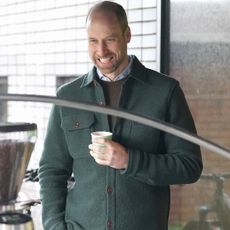 Prince William's "Finance Bro" Style Transformation Hints at New "Confidence"
Prince William's "Finance Bro" Style Transformation Hints at New "Confidence"Just add a Patagonia vest.
By Kristin Contino Published
-
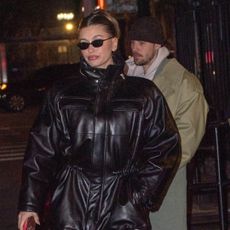 Hailey Bieber and Justin Bieber Commit to Winter's Edgiest Coat Trends
Hailey Bieber and Justin Bieber Commit to Winter's Edgiest Coat TrendsThe pair dressed up to eat fancy pizza rolls at Taylor Swift's favorite restaurant.
By Hanna Lustig Published
-
 The Historic Election Victories Worth Celebrating
The Historic Election Victories Worth CelebratingIncluding momentous firsts, abortion protections, and New York's "Equal Rights Amendment."
By Iris Goldsztajn Published
-
 36 Ways Women Still Aren't Equal to Men
36 Ways Women Still Aren't Equal to MenIt's just one of the many ways women still aren't equal to men.
By Brooke Knappenberger Last updated
-
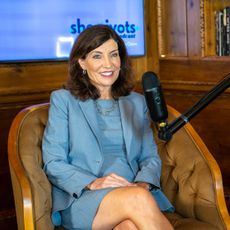 How New York's First Female Governor Plans to Fight for Women If Reelected
How New York's First Female Governor Plans to Fight for Women If ReelectedKathy Hochul twice came to power because men resigned amid sexual harassment scandals. Here, how she's leading differently.
By Emily Tisch Sussman Last updated
-
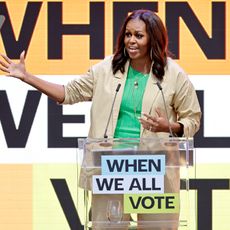 5 Practical Things You Can Do to Protect Democracy
5 Practical Things You Can Do to Protect DemocracyAdvice from top celebrities and Michelle Obama herself.
By Erin Geiger Smith Published
-
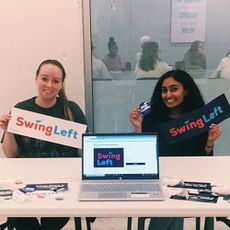 Why the 2022 Midterm Elections Are So Critical
Why the 2022 Midterm Elections Are So CriticalAs we blaze through a highly charged midterm election season, Swing Left Executive Director Yasmin Radjy highlights rising stars who are fighting for women’s rights.
By Tanya Benedicto Klich Published
-
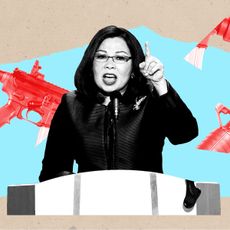 Tammy Duckworth: 'I’m Mad as Hell' About the Lack of Federal Action on Gun Safety
Tammy Duckworth: 'I’m Mad as Hell' About the Lack of Federal Action on Gun SafetyThe Illinois Senator won't let the memory of the Highland Park shooting just fade away.
By Sen. Tammy Duckworth Published
-
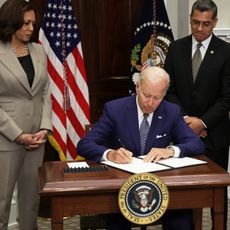 Breaking Down President Biden’s New Executive Order on Abortion Rights
Breaking Down President Biden’s New Executive Order on Abortion Rights“We feel really strongly, particularly given the tremendous amount of legal chaos that has ensued since this decision, that it’s incumbent on us to be careful.”
By Lorena O'Neil Last updated
-
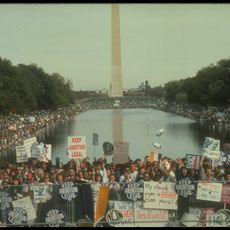 Roe Is Gone. We Have to Keep Fighting.
Roe Is Gone. We Have to Keep Fighting.Democracy always offers a path forward even when we feel thrust into the past.
By Beth Silvers and Sarah Stewart Holland, hosts of Pantsuit Politics Podcast Published